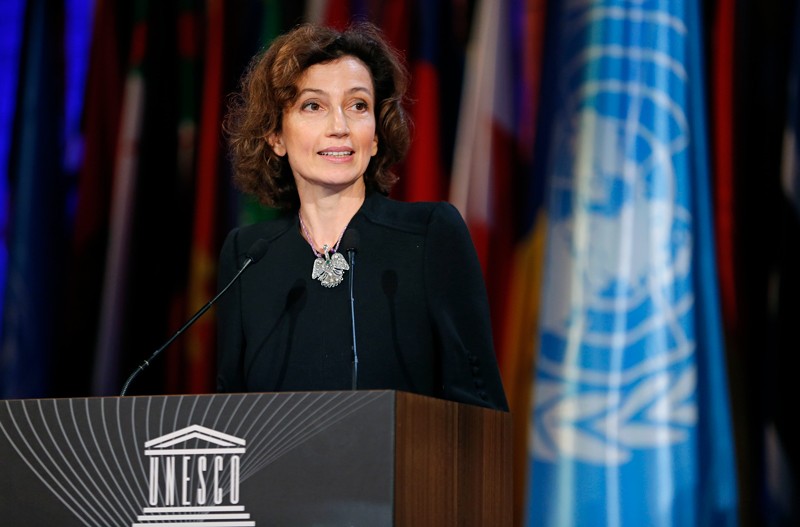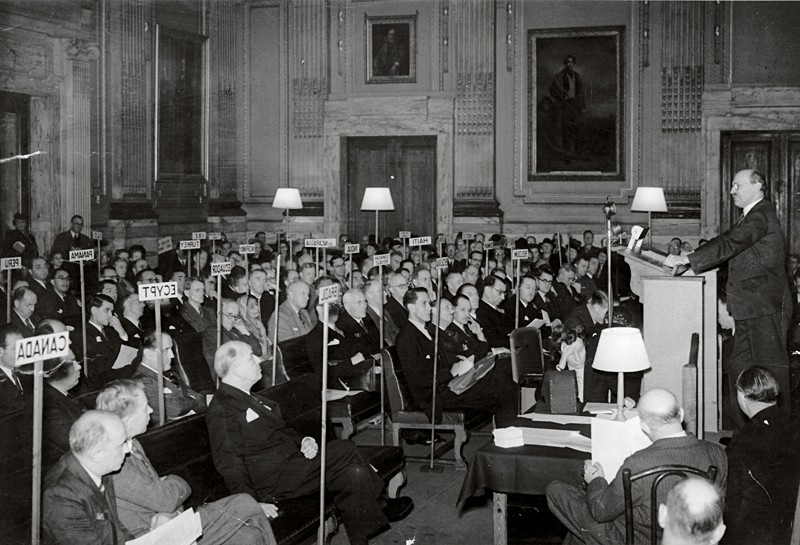UNESCO was born on 16 November 1945, just a few weeks after the end of the Second World War. Its founders had been persuaded that science — along with culture and education — could help to cement peace between countries, protect human rights and improve living standards. Now, as the United Nations and UNESCO turn 75, the Paris-based agency is struggling to determine its future.
There’s a lot to show for those 75 years. Today, UNESCO operates the system that has awarded World Heritage status to more than 1,100 important historical sites; the agency has also established a global network of more than 700 biosphere reserves. It holds nations to account on their commitments to get every child into school, and monitors threats to journalists around the world.
But among the UN’s family of specialized agencies, UNESCO has never been properly funded — and it has been trying to recover from a funding crisis for the past decade. Data supplied by UNESCO show that the agency spent US$1.1 billion in the 2-year period from 2010 to 2011, but in 2012–13, spending was down by 16% after the Palestinian Authority was granted full membership and the United States and Israel stopped their financial contributions in protest. Although its spending was back to $1.1 billion by 2018–19, inflation has greatly reduced its spending power. UNESCO is now in the middle of a transformation designed, in part, to enable it to live within its means.
When Nature spoke to UNESCO’s current and former staff, as well as to researchers who study and collaborate with it, we found immense affection for the organization and respect for its past achievements. However, there was also a sense of frustration over its future. UNESCO needs to put these concerns to rest once and for all.
Pulling together
UNESCO’s history is a stellar example of science’s power to advance both knowledge and diplomacy. In the wake of two world wars, and especially during the cold war, the agency helped to unlock the doors to international scientific cooperation, particularly in the physical sciences.
In 1951, it hosted the meeting that led to the creation of CERN, Europe’s particle-physics laboratory. Since then, CERN has mushroomed from a project intended to reunite and stimulate Europe’s physicists to a place where scientists from all over the world can collaborate. It has spawned a number of technological spin-offs and has maintained its commitment to global knowledge-sharing.
When nations were reluctant to share their oceans data, UNESCO hosted the first meeting of the International Oceanographic Commission in 1961. The commission still has a role in international efforts to sustainably manage ocean resources. And UNESCO’s efforts to connect scientists from countries with difficult relationships continued with SESAME, the Middle East’s first synchrotron light source. That project was launched in 1999 and provides an essential tool to researchers in a range of fields, from medicine to materials science. Getting scientists from Iran and Israel, or Cyprus and Turkey — all SESAME member countries — to work together is no small achievement.
That same year, UNESCO co-organized the World Conference on Science in Budapest. One of the outcomes was the creation of SciDev.Net, one of the first open-access platforms for sharing the results of scientific research, on which Science and Nature worked together to share some of their content with low- and middle-income countries.
And all of this happened in an organization that might never have had an ‘S’ in its title. UNESCO was originally conceived to protect and promote education and culture. It made room for science after leading scientists andscience media (including Nature) helped to persuade the UN’s founding nations that their vision of a world at peace could not be a world without science.
And yet, for all its external successes, UNESCO has faced difficulties in how it is treated by some of its larger member states. That, in turn, has affected the ability of its staff to get things done. It hasn’t helped that some countries have treated their membership of UNESCO like a revolving door, joining and leaving as they wish, with little regard for the consequences for the agency’s work when their funding stops. The United States has left twice, and the United Kingdom and Singapore have also withdrawn in the past, then returned some years later.
When richer countries stop paying, projects on the ground suffer, but so does trust in those nations’ commitment to UNESCO’s goals. It means officials at UNESCO’s headquarters are forced to spend time and energy raising funds from other sources, and reorganizing staff and management structures to fit changing priorities — and end up spreading themselves too thinly. Time spent fire-fighting is time taken away from other priorities.
In 2013, UNESCO’s leadership responded to its loss of income with a proposal that would probably have led to most of its work in its communication and information sector being abolished. But this was seen as a step too far and rejected by member states. Now, the director-general Audrey Azoulay is trying a different approach — intended, in part, to take some of the political heat out of UNESCO’s work by focusing on things more countries can agree on, and playing to the agency’s strengths as cultural guardian, ethical compass and laboratory of ideas.
Azoulay and her team have initiated a “strategic transformation” to spearhead internal reform and programme change — the latter requiring approval by member states late next year. Meanwhile, she is prioritizing five areas: rebuilding and reviving the devastated Iraqi city of Mosul; promoting open science; working on much-needed common standards on the ethics of artificial intelligence; a long-term vision for education; and biodiversity. The last of these is a belated, but much-needed recognition of UNESCO’s long-standing experience in the study of Indigenous and local knowledge across research fields. Its importance is bolstered by the results of a UNESCO survey that asked 15,000 people what they saw as the biggest threats to peace — two-thirds of respondents said biodiversity and climate change were their greatest concern.
There’s also a strong argument for reviving UNESCO’s earlier science mission. In today’s fractured world, fundamental and applied science could once again be used to help bring people and societies together. In the Middle East, for example, UNESCO could help to reconnect scientists in Qatar with those in neighbouring countries. At present, researchers are unable to collaborate because of a regional dispute. The agency could have a greater role in South Asia’s science, which is affected by the strained relations between India and Pakistan. And UNESCO could do more for researchers in Europe, where fractures are developing between members of the European Union.
UNESCO should seek to reconnect people through science, as it has done before. But there can be no illusions about how hard the task will be. After 75 years, UNESCO is facing one of its toughest tests. Member states must make every effort to pull together with the agency’s headquarters and its field staff. UNESCO’s potential in a crisis-ridden world should not be underestimated. If UNESCO ceased to exist, the world would need to recreate it.
"and" - Google News
November 25, 2020 at 07:34PM
https://ift.tt/3l5NjBo
UNESCO must reform to stay relevant — and reconnect people through science - Nature.com
"and" - Google News
https://ift.tt/35sHtDV
https://ift.tt/2ycZSIP
And
Bagikan Berita Ini


















0 Response to "UNESCO must reform to stay relevant — and reconnect people through science - Nature.com"
Post a Comment